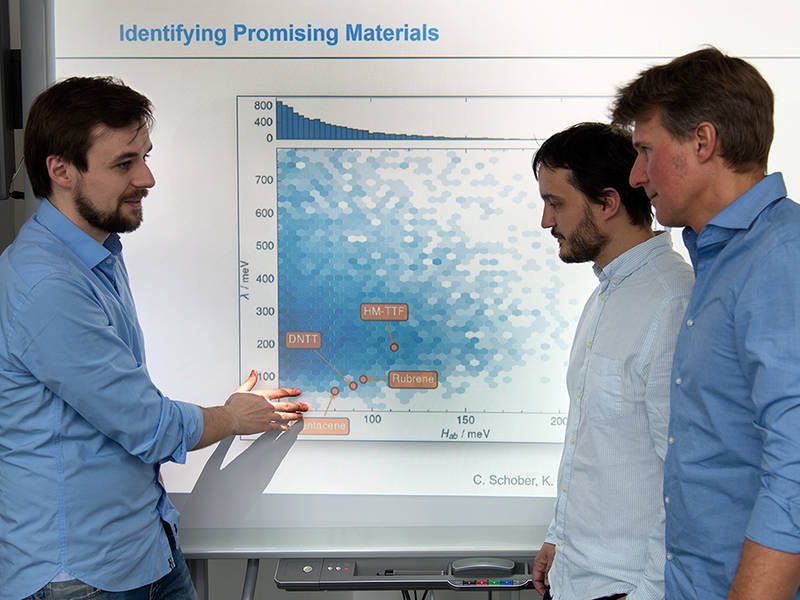Feb 15 2019
Organic semiconductors are known to be flexible and lightweight, and they can even be manufactured easily. However, these materials usually do not fulfill expectations with regards to stability and efficiency.
 First author Christian Kunkel, PD Dr Harald Oberhofer and Professor Karsten Reuter (fltr). (Image credit: A. Battenberg/TUM)
First author Christian Kunkel, PD Dr Harald Oberhofer and Professor Karsten Reuter (fltr). (Image credit: A. Battenberg/TUM)
At the Technical University of Munich (TUM), researchers are currently applying data mining techniques to discover potential organic compounds for next-generation electronics.
It is extremely energy intensive to fabricate conventional silicon-based solar cells, and added to this, these are stiff and fragile. By contrast, organic semiconductor materials are not only lightweight but also flexible. They could offer a promising alternative solution; however, their stability and efficiency are not on par with conventional solar cells.
Karsten Reuter, Professor of Theoretical Chemistry at the Technical University of Munich, along with his team, is searching for new substances for photovoltaics applications and also for light-emitting diodes (OLEDs) and displays. The investigators have zeroed in on organic compounds that build on carbon atom frameworks.
Contenders for the electronics of tomorrow
These molecules—based on their composition and structure and the materials created from them—exhibit an array of physical characteristics, offering many potential candidates for next-generation electronics.
To date, a major problem has been tracking them down: It takes weeks to months to synthesize, test and optimize new materials in the laboratory. Using computational screening, we can accelerate this process immensely.
Karsten Reuter, Professor, Chair of Theoretical Chemistry, Technical University of Munich.
Computers instead of test tubes
Neither Bunsen burners nor test tubes are required by the researcher to look for potential organic semiconductors. Reuter and his team examined existing databases using a robust computer. This virtual search for patterns and relationships is referred to as data mining.
Knowing what you are looking for is crucial in data mining. In our case, it is electrical conductivity. High conductivity ensures, for example, that a lot of current flows in photovoltaic cells when sunlight excites the molecules.
Dr Harald Oberhofer, PD and Study Lead, Technical University of Munich.
Algorithms identify key parameters
With the help of his algorithms, he can look for highly specific physical parameters—a significant one is, for instance, the “coupling parameter.” Larger coupling parameter will correspondingly cause the electrons to move faster from one molecule to the next.
“Reorganization energy” is an additional parameter that defines how expensive it is for a molecule to adjust its structure to the fresh charge after a charge transfer— the lesser the energy required, the greater the conductivity.
Using the algorithms, the researchers examined the structural data of 64,000 organic compounds and subsequently assembled them into clusters. This resulted in the carbon-based molecular frameworks as well as the “functional groups”—that is, the compounds adhered laterally to the central framework conclusively impact the conductivity.
Identifying molecules using artificial intelligence
The clusters emphasize functional groups and structural frameworks that enable satisfactory charge transfer, rendering them especially appropriate for developing electronic components.
We can now use this to not only predict the properties of a molecule, but using artificial intelligence we can also design new compounds in which both the structural framework and the functional groups promise very good conductivity.
Karsten Reuter, Professor, Chair of Theoretical Chemistry, Technical University of Munich.